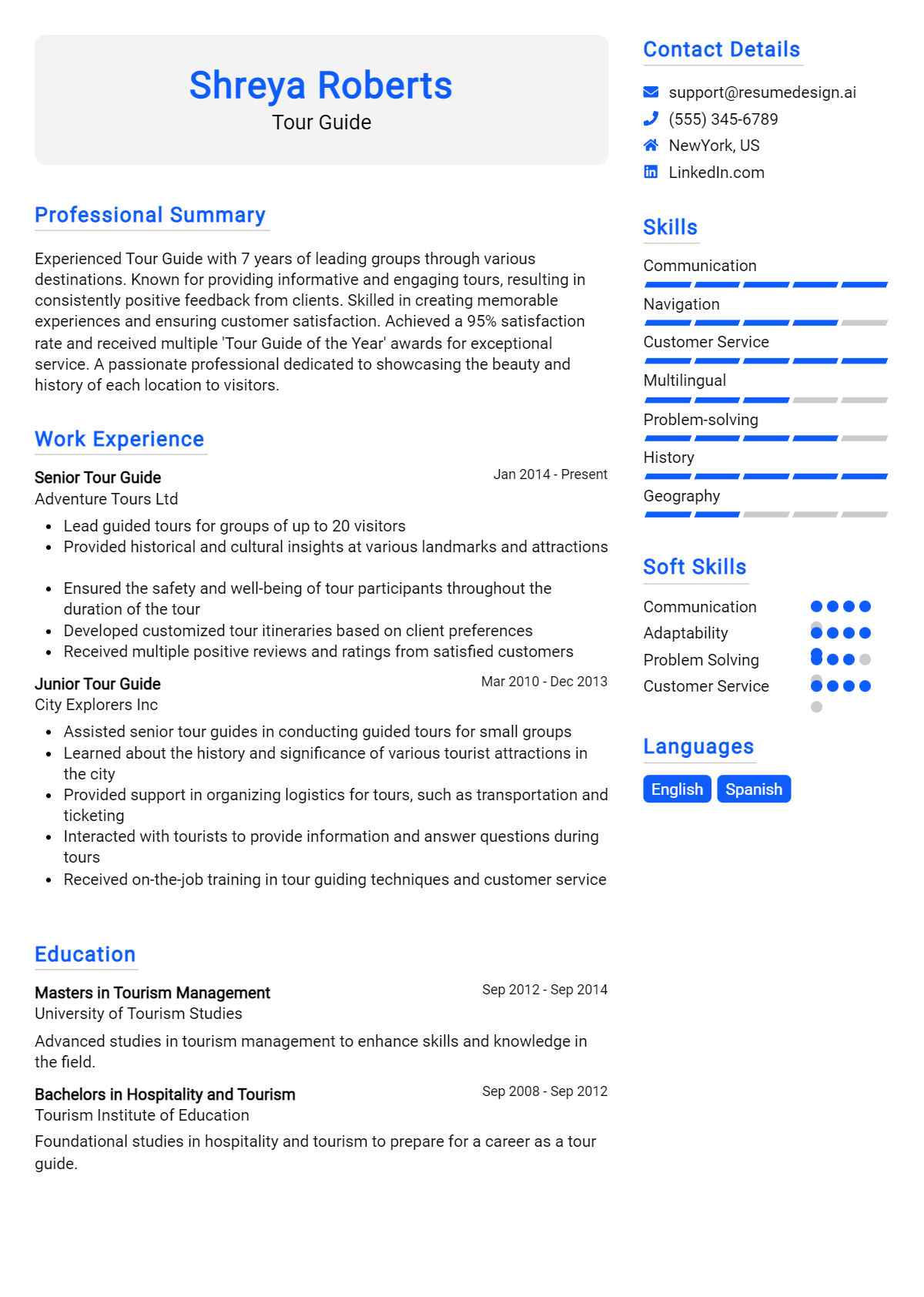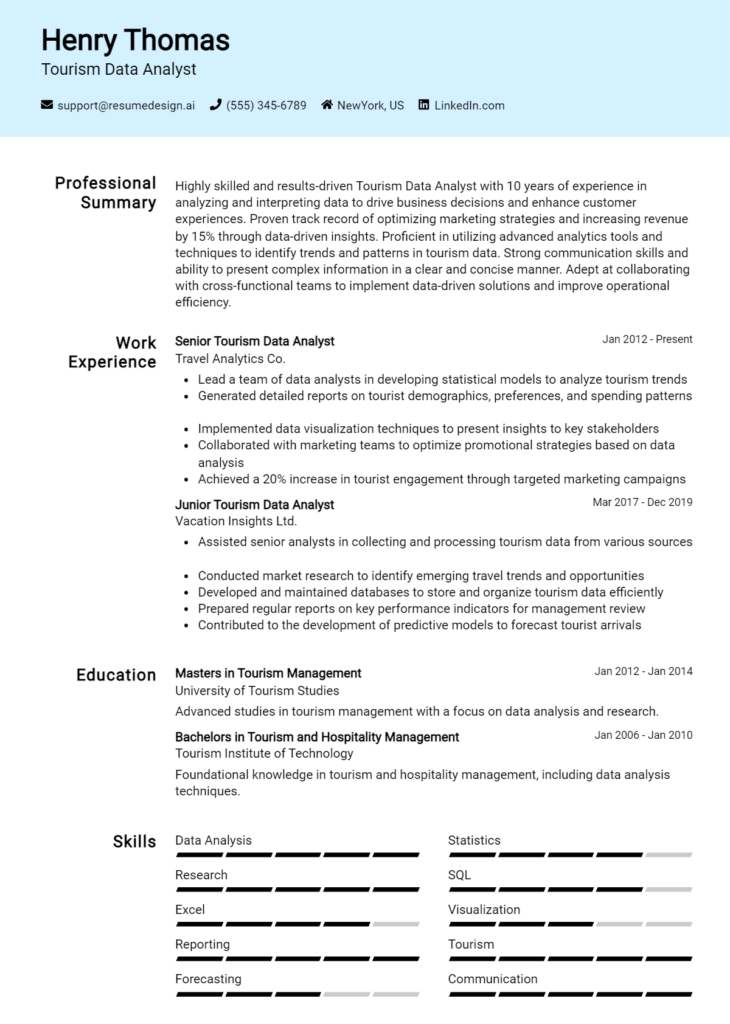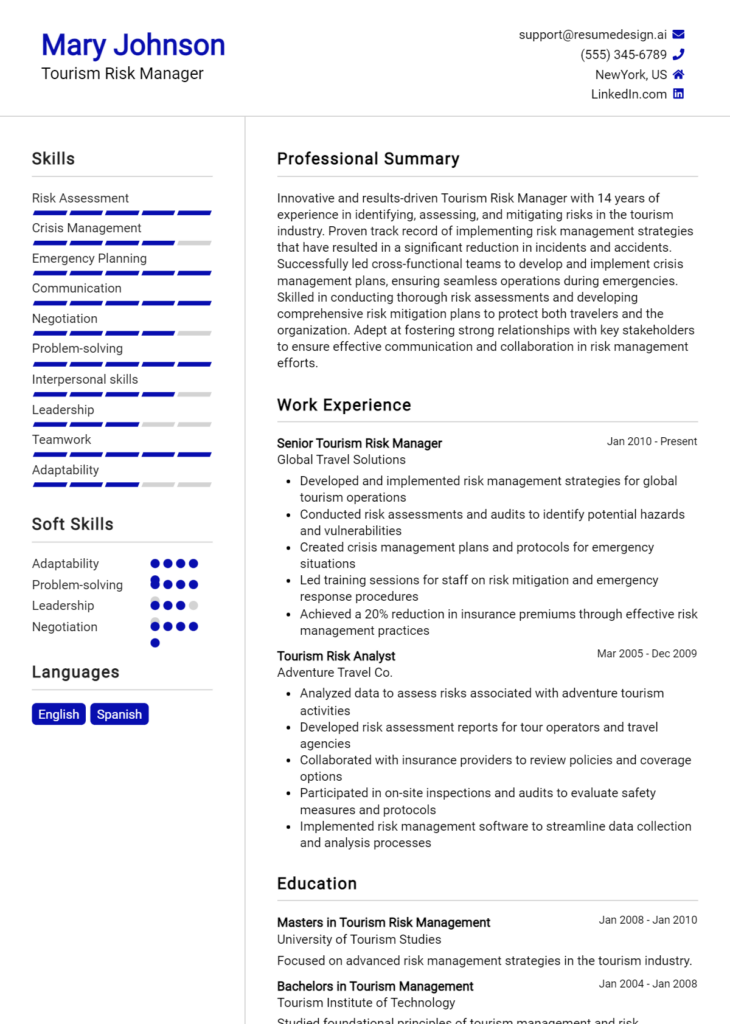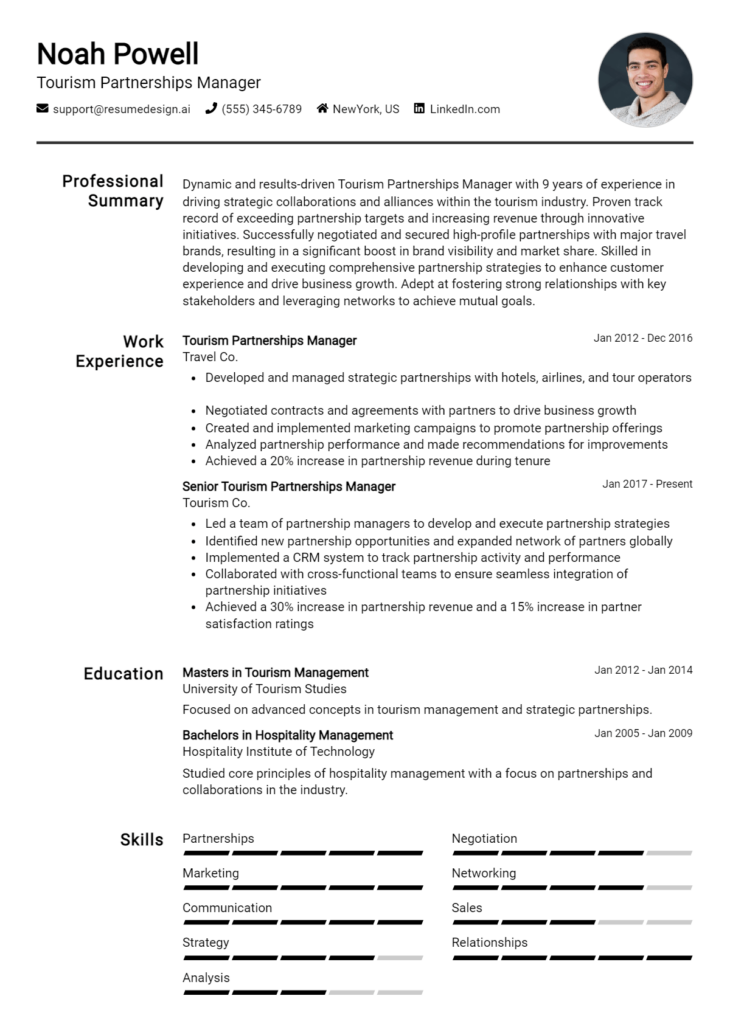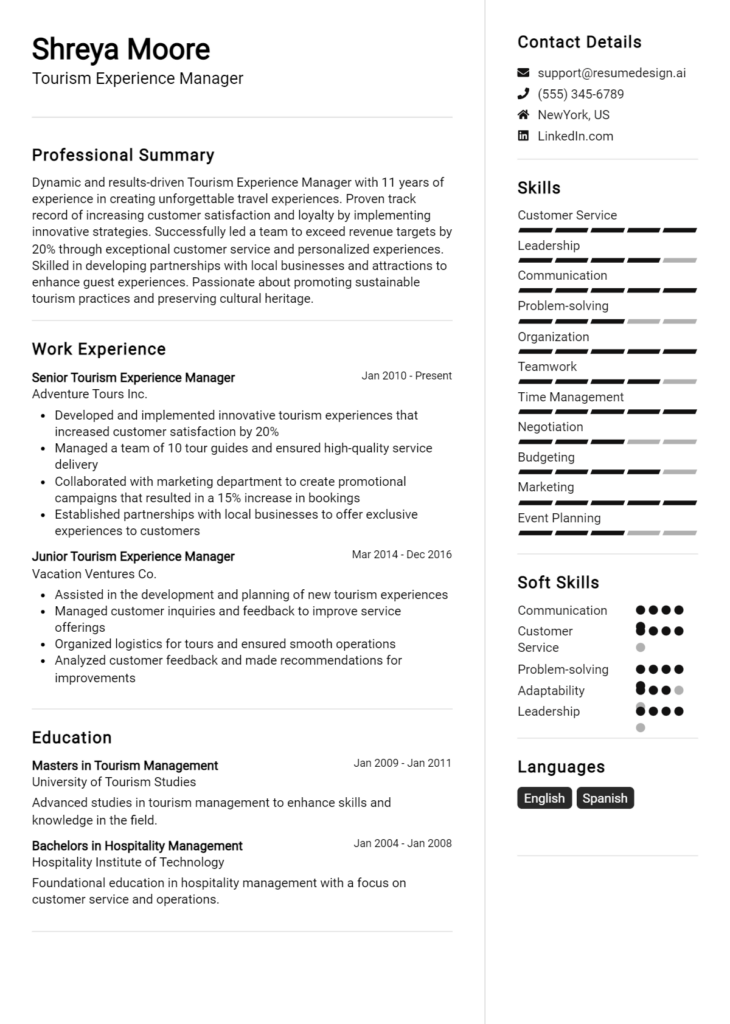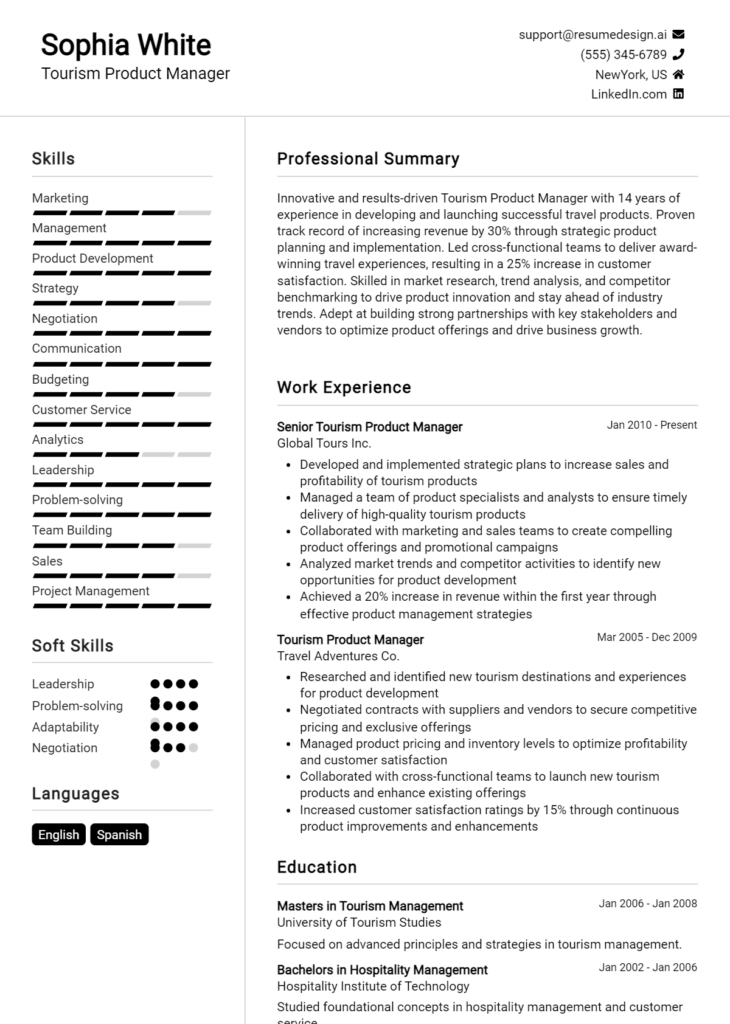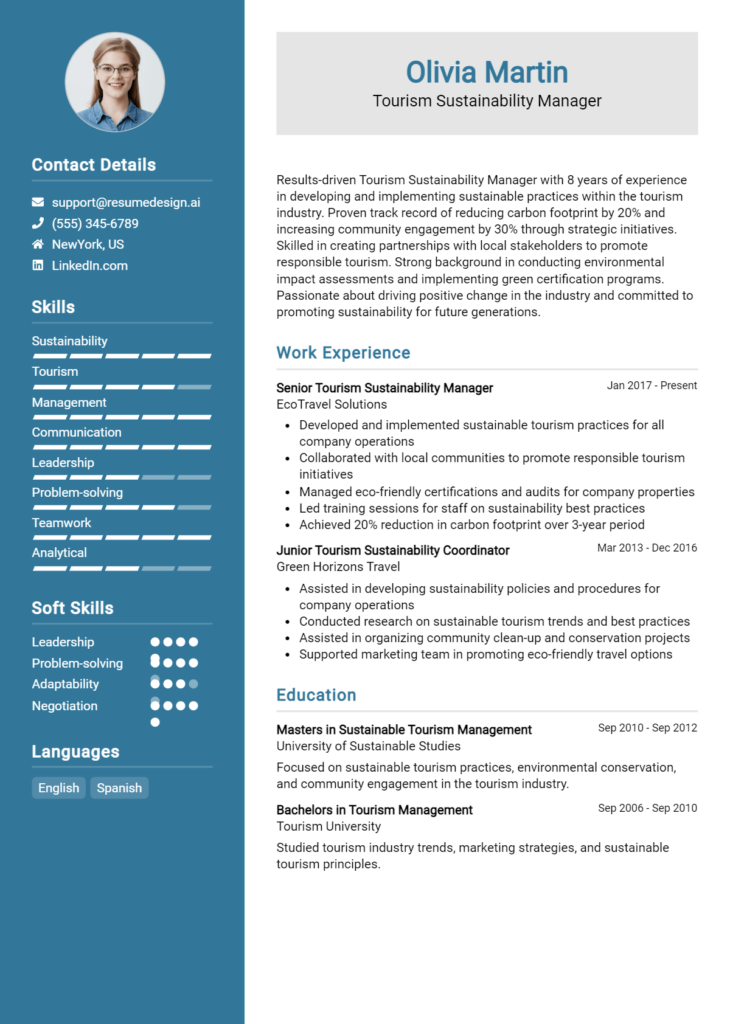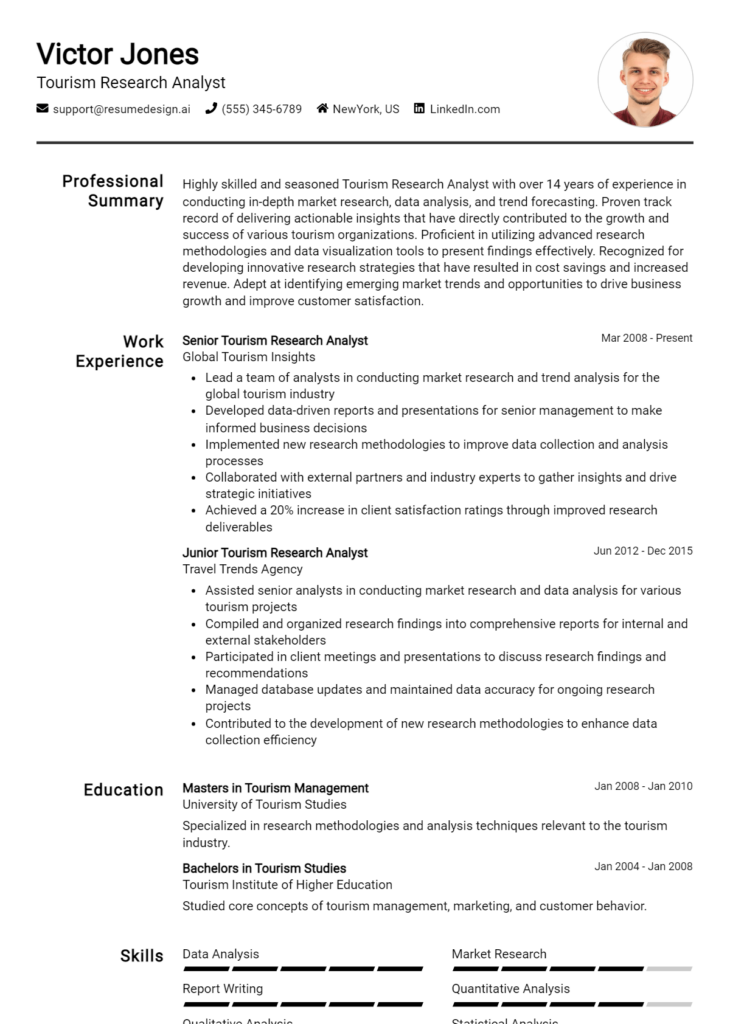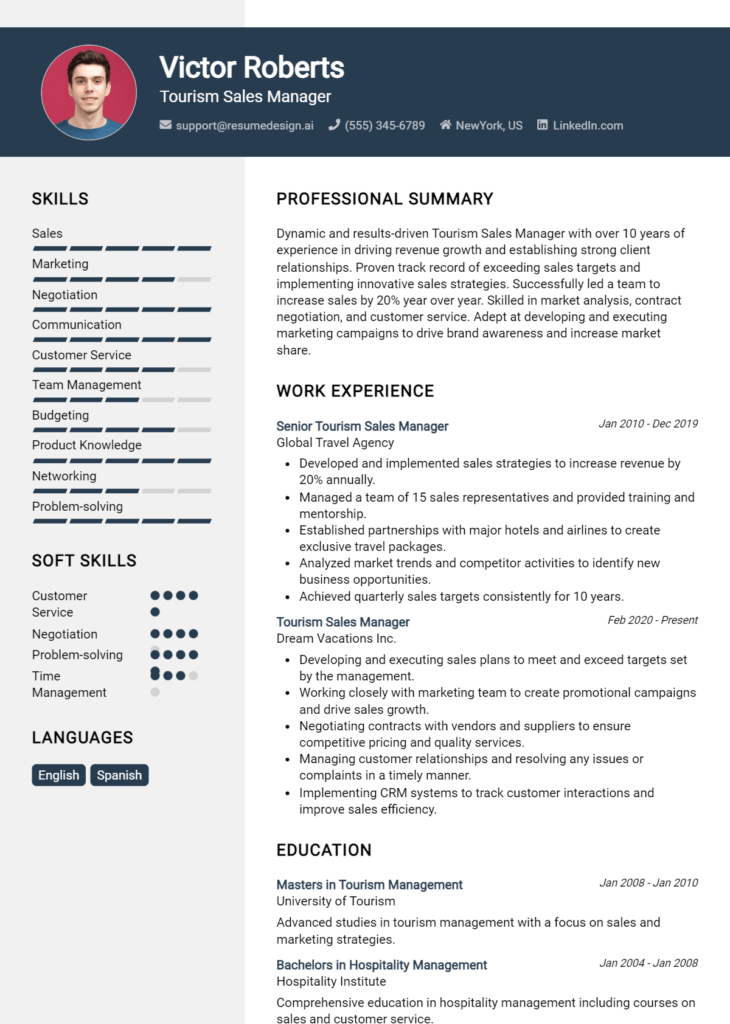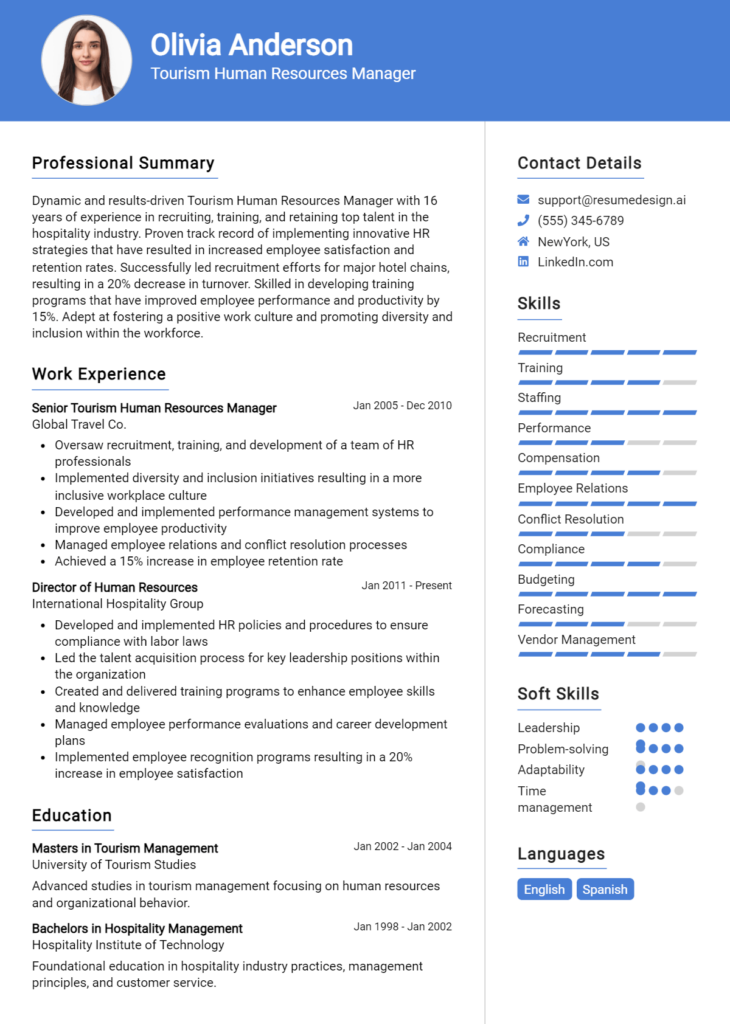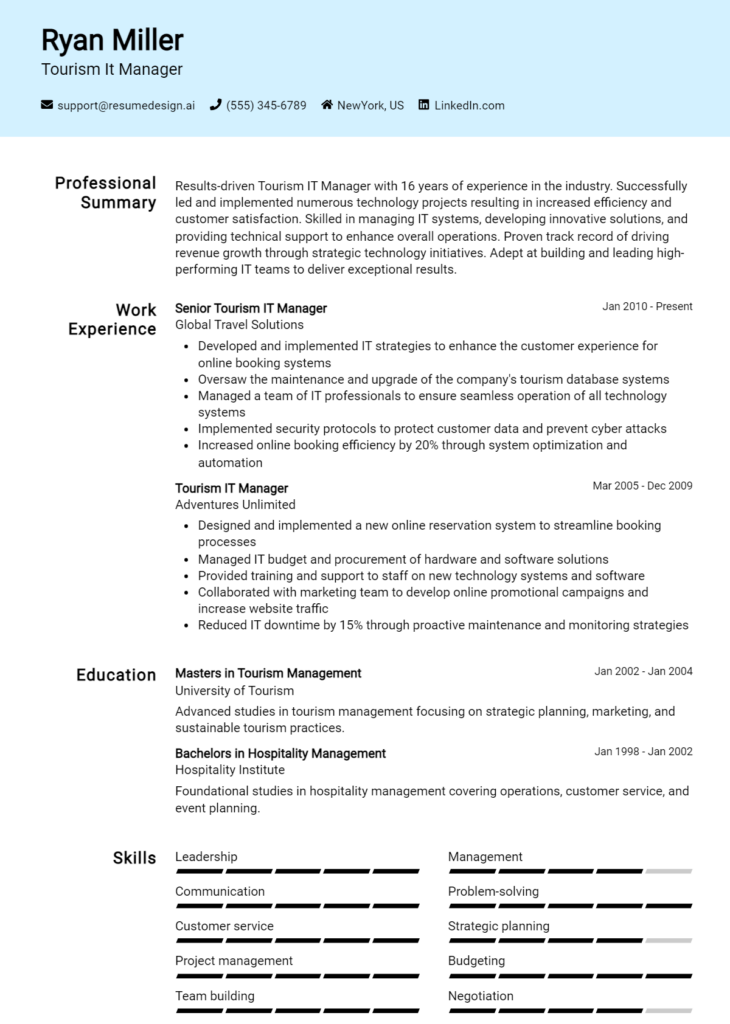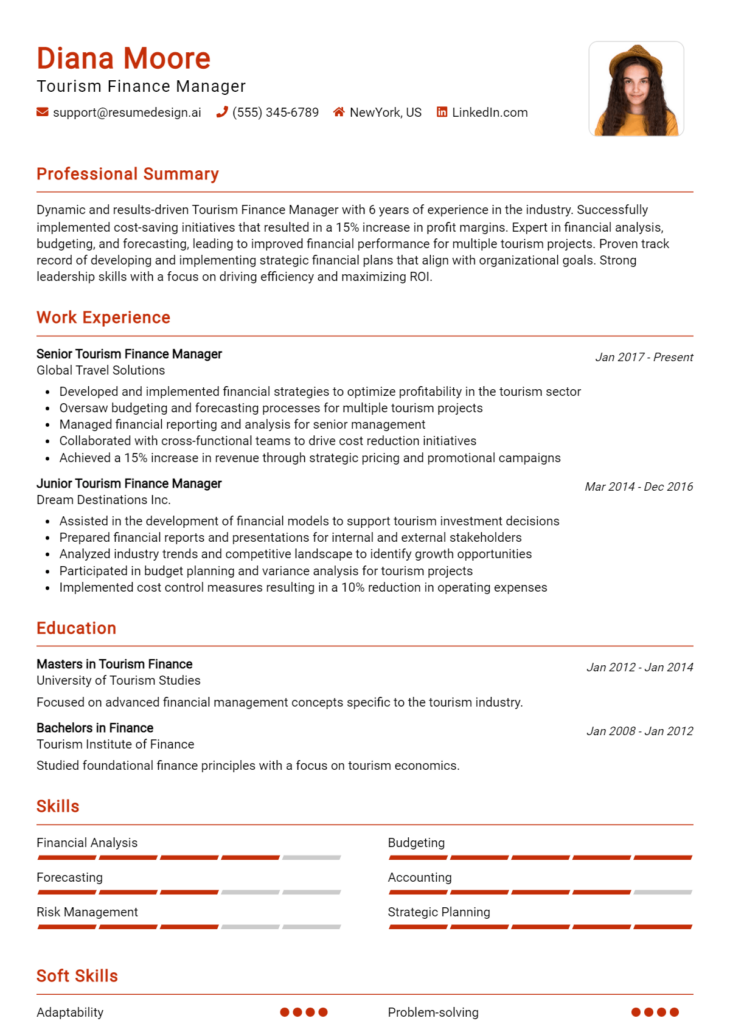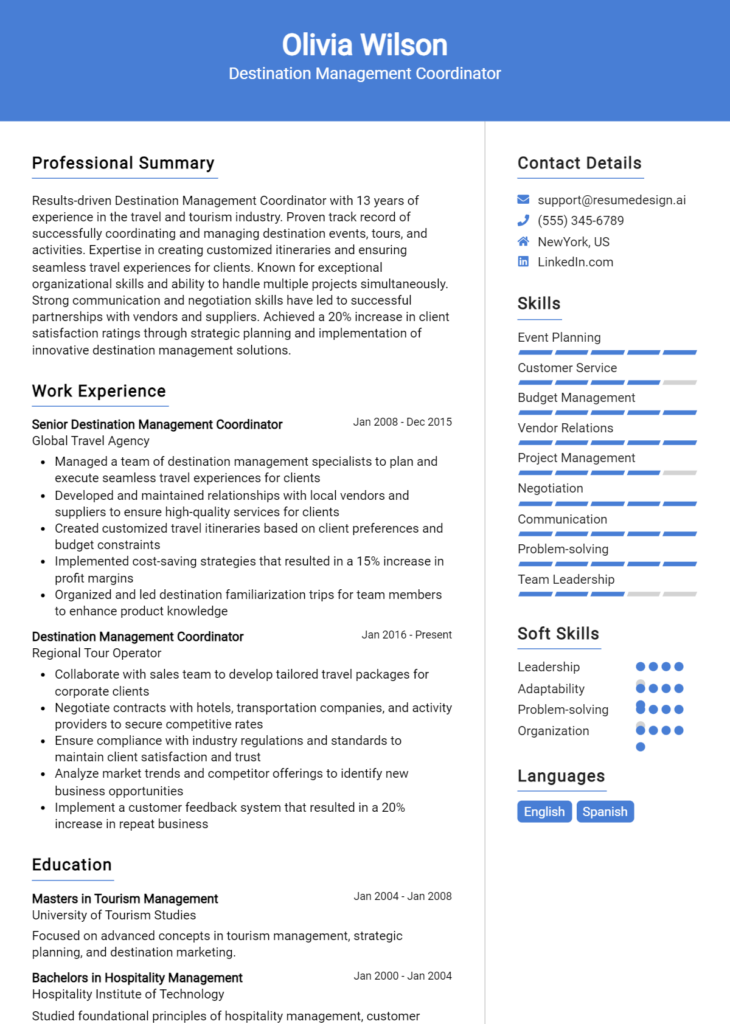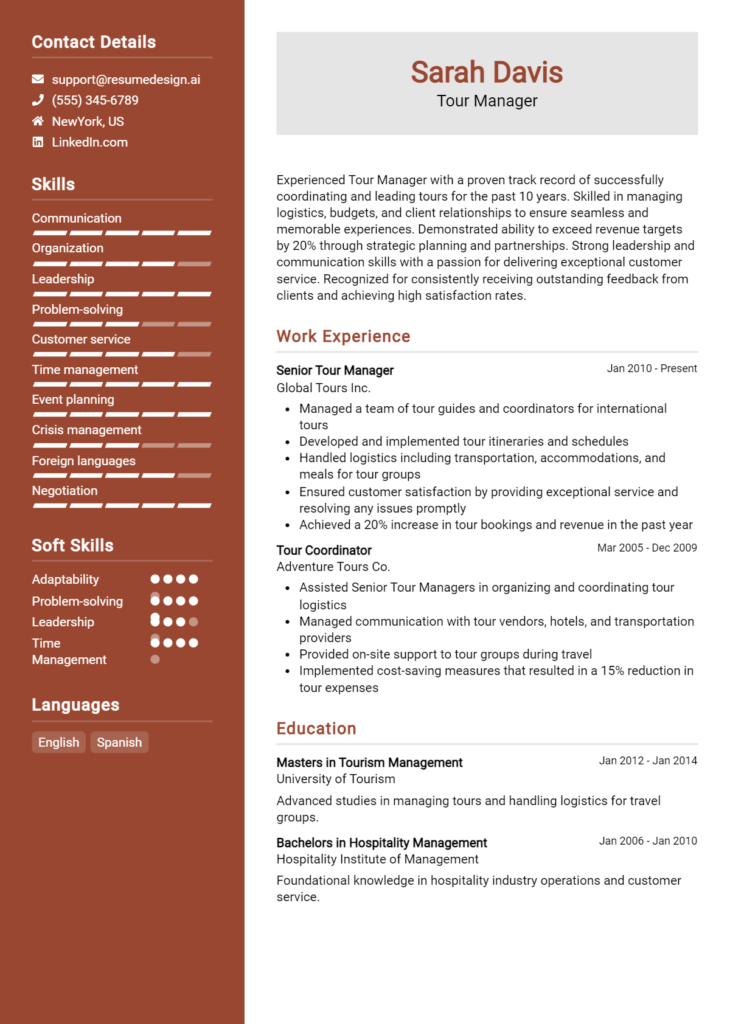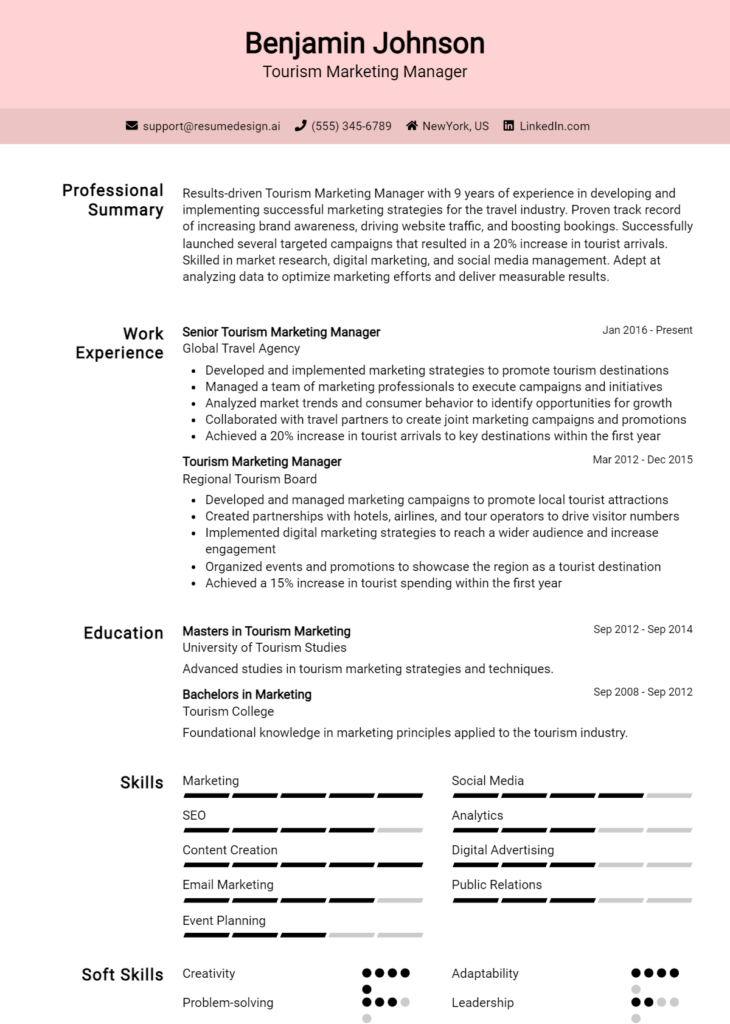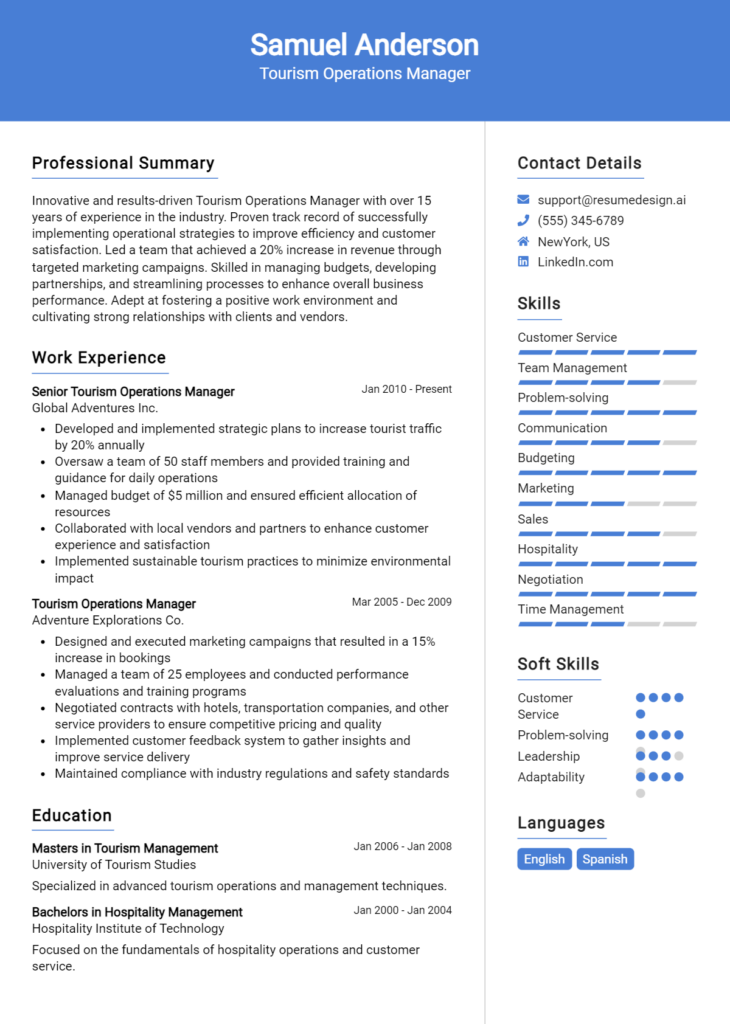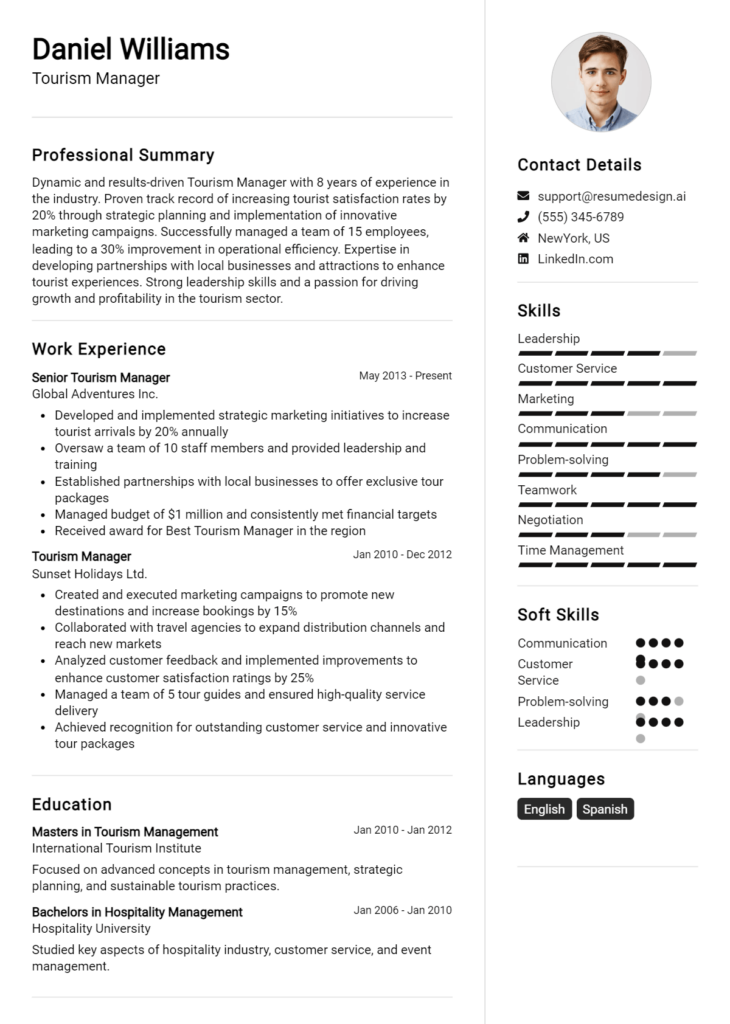Tour Guide Core Responsibilities
As a Tour Guide, one is responsible for leading groups through various attractions, providing engaging narratives, and ensuring a seamless experience. This role requires strong communication, organizational, technical, and problem-solving skills to bridge the gap between guests and operational departments like booking and customer service. A successful tour guide contributes to the organization's goals by enhancing customer satisfaction and promoting brand loyalty. A well-structured resume is essential to effectively showcase these qualifications and experiences.
Common Responsibilities Listed on Tour Guide Resume
- Conducting informative and engaging tours to various attractions.
- Providing historical and cultural context to enhance guest experiences.
- Managing group dynamics and ensuring guest safety.
- Coordinating with transportation and hospitality services.
- Responding to guest inquiries and addressing concerns promptly.
- Creating and distributing promotional materials about tours.
- Maintaining knowledge of local regulations and safety standards.
- Collecting feedback to improve tour quality and customer satisfaction.
- Assisting in the training of new tour guides.
- Utilizing technology for bookings and customer management.
- Developing themed tours to attract diverse audiences.
High-Level Resume Tips for Tour Guide Professionals
A well-crafted resume is a crucial tool for Tour Guide professionals aiming to stand out in a competitive job market. As the first point of contact with potential employers, your resume needs to make a lasting impression, reflecting not only your skills and achievements but also your passion for guiding and storytelling. A strong resume can effectively convey your unique qualifications, setting the stage for an interview opportunity. In this guide, you'll find practical and actionable resume tips specifically tailored for Tour Guide professionals to help you present your best self on paper.
Top Resume Tips for Tour Guide Professionals
- Tailor your resume to the job description by incorporating relevant keywords and phrases.
- Highlight your experience in the tourism and hospitality industry, showcasing any specific tours or events led.
- Quantify your achievements, such as the number of tours conducted or customer satisfaction ratings.
- Include industry-specific skills like multilingual abilities, storytelling expertise, and knowledge of local history and culture.
- Use a clean, professional format that makes your resume easy to read and visually appealing.
- Incorporate testimonials or feedback from previous clients or employers to emphasize your effectiveness as a guide.
- List relevant certifications, such as first aid training or specialized tour guide licenses.
- Demonstrate your passion for travel and tourism through a well-written personal statement or summary.
- Keep your resume concise, ideally one page, focusing on the most relevant information.
- Proofread your resume carefully to eliminate any errors that could undermine your professionalism.
By implementing these tips, you can significantly enhance your resume and increase your chances of landing that coveted job in the Tour Guide field. A polished, targeted resume will not only showcase your qualifications but also reflect your enthusiasm and commitment to delivering exceptional experiences for travelers, setting you apart from other candidates.
Why Resume Headlines & Titles are Important for Tour Guide
In the competitive field of tourism, a Tour Guide's resume must stand out to capture the attention of hiring managers. This is where a powerful resume headline or title comes into play. A well-crafted headline serves as a concise summary of a candidate's key qualifications and expertise, instantly grabbing the attention of potential employers. It should encapsulate the essence of the applicant's experience and skills in a single impactful phrase, making it easier for hiring managers to recognize their potential fit for the role. A strong headline is not only relevant but also tailored specifically to the job applied for, ensuring it resonates with the expectations of the hiring team.
Best Practices for Crafting Resume Headlines for Tour Guide
- Keep it concise: Aim for one impactful sentence or phrase.
- Be role-specific: Tailor the headline to the Tour Guide position.
- Highlight key skills: Include relevant skills or experiences that set you apart.
- Use action-oriented language: Choose dynamic verbs that convey enthusiasm and proactivity.
- Incorporate keywords: Use industry-specific terms that align with the job description.
- Avoid clichés: Stay away from generic phrases that do not add value.
- Showcase achievements: Mention any notable accomplishments that enhance your candidacy.
- Make it memorable: Choose wording that leaves a lasting impression on the reader.
Example Resume Headlines for Tour Guide
Strong Resume Headlines
"Experienced Tour Guide with 5+ Years of Leading Cultural and Historical Tours"
“Certified Eco-Tour Guide Passionate About Sustainable Travel Practices”
“Dynamic Tour Guide with Expertise in Engaging Group Experiences and Local History”
“Multilingual Tour Guide Specializing in Adventure Tours and Guest Relations”
Weak Resume Headlines
“Tour Guide Looking for a Job”
“Experienced Worker”
“Seeking Opportunities in the Travel Industry”
The strong headlines are effective because they clearly convey the candidate's strengths and relevant experiences, making it easy for hiring managers to identify their potential value. They incorporate specific skills, years of experience, and unique qualifications that align with the Tour Guide role. In contrast, the weak headlines fail to impress due to their vague and generic nature; they do not provide any specific information about the candidate's qualifications or what they bring to the table, making them easily forgettable in a sea of applicants.
Writing an Exceptional Tour Guide Resume Summary
A well-crafted resume summary is crucial for a Tour Guide, as it serves as the first impression on hiring managers who are sifting through numerous applications. A strong summary quickly captures attention by highlighting key skills, relevant experience, and notable accomplishments that align with the demands of the role. It should be concise, impactful, and tailored specifically to the job the candidate is pursuing, ensuring that it showcases their unique qualifications and enthusiasm for the position.
Best Practices for Writing a Tour Guide Resume Summary
- Quantify Achievements: Use numbers and statistics to demonstrate your impact, such as the number of tours conducted or customer satisfaction ratings.
- Focus on Relevant Skills: Highlight skills that are pertinent to the role, such as communication, storytelling, and customer service.
- Tailor the Summary: Customize your summary for each job application by incorporating keywords from the job description.
- Be Concise: Keep your summary brief, ideally within 2-4 sentences, to ensure clarity and impact.
- Showcase Unique Selling Points: Identify what sets you apart from other candidates, such as specialized knowledge or unique experiences.
- Utilize Action Verbs: Start sentences with strong action verbs to convey a sense of proactivity and engagement.
- Maintain Professional Tone: Use a professional yet approachable tone that reflects the nature of the tourism industry.
Example Tour Guide Resume Summaries
Strong Resume Summaries
Dynamic tour guide with over 5 years of experience leading historical and cultural tours in major cities, achieving a 95% customer satisfaction rating based on feedback scores.
Enthusiastic and knowledgeable tour guide with a passion for delivering engaging experiences, having successfully conducted over 300 tours with an average group size of 15, resulting in a 40% increase in repeat customers.
Bilingual tour guide fluent in English and Spanish, specializing in eco-tourism. Led over 150 nature tours, contributing to a 20% increase in tour bookings during peak seasons.
Weak Resume Summaries
I am a tour guide with experience in the tourism industry. I enjoy showing people around and have a good knowledge of the area.
Seeking a position as a tour guide where I can use my skills and work with people. I have done some tours before.
The examples of strong resume summaries stand out due to their specificity, quantifiable results, and direct relevance to the Tour Guide role. They showcase measurable achievements and emphasize unique skills, which makes them compelling to hiring managers. In contrast, the weak resume summaries lack detail and impact, failing to convey the candidate's qualifications or enthusiasm for the position, making it difficult for them to capture the attention of potential employers.
Work Experience Section for Tour Guide Resume
The work experience section of a Tour Guide resume is crucial, as it provides potential employers with insight into the candidate's relevant background and competencies. This section highlights not only the technical skills essential for guiding tours—such as knowledge of history, geography, and local attractions—but also the candidate's ability to manage teams and deliver high-quality experiences to guests. By quantifying achievements and aligning past experiences with industry standards, candidates can effectively demonstrate their value and readiness for the role of a Tour Guide.
Best Practices for Tour Guide Work Experience
- Highlight specific tours or events you have led, including the number of participants and locations covered.
- Use metrics to quantify your impact, such as customer satisfaction ratings or repeat bookings.
- Showcase your technical skills related to tour guiding, such as language proficiency or knowledge of audio-visual equipment.
- Emphasize collaboration with other team members or departments to enhance the tour experience.
- Detail any training or certifications received that are relevant to the role.
- Include testimonials or feedback from clients to strengthen credibility.
- Demonstrate any leadership roles held, such as mentoring new guides or managing a team.
- Align your experiences with industry trends, showcasing adaptability to changing tour demands.
Example Work Experiences for Tour Guide
Strong Experiences
- Led over 100 historical walking tours in downtown, achieving a 95% customer satisfaction rating based on post-tour surveys.
- Managed a team of 5 guides during peak tourist season, resulting in a 30% increase in repeat bookings year over year.
- Developed and implemented a new training program for tour guides, improving overall performance metrics by 20%.
- Coordinated with local businesses to provide exclusive discounts for tour participants, enhancing the overall guest experience and attracting 50 new customers each month.
Weak Experiences
- Worked as a tour guide for several years.
- Assisted in leading tours and provided information to guests.
- Involved in team activities during tours.
- Participated in some training sessions related to tour guiding.
The examples provided illustrate the difference between strong and weak experiences in a Tour Guide resume. Strong experiences are specific, quantifiable, and demonstrate leadership and collaboration, making them compelling to potential employers. In contrast, weak experiences lack detail, metrics, and clear contributions, rendering them unimpressive and less valuable in showcasing the candidate's qualifications for the role.
Education and Certifications Section for Tour Guide Resume
The education and certifications section of a Tour Guide resume is crucial for demonstrating a candidate's academic background and specialized knowledge in the field. This section serves as a platform to showcase relevant degrees, industry-recognized certifications, and ongoing professional development efforts, all of which enhance the candidate's credibility and alignment with the job role. By providing detailed information about relevant coursework and specialized training, candidates can effectively communicate their qualifications and commitment to excellence in guiding tours and providing exceptional experiences for tourists.
Best Practices for Tour Guide Education and Certifications
- Focus on relevant degrees, such as Hospitality Management, Travel and Tourism, or History.
- Include certifications from recognized organizations, such as the National Tour Association or the International Tour Management Institute.
- Highlight any specialized training, such as first aid or foreign language courses, that enhance guiding capabilities.
- Provide detailed descriptions of relevant coursework that demonstrate knowledge applicable to the tour guide role.
- Keep the information up to date, ensuring that recent certifications and courses are listed.
- Use clear formatting and bullet points to enhance readability and impact.
- Prioritize advanced or industry-recognized credentials to stand out among other candidates.
- Tailor the education and certifications section to match the specific requirements of the tour guide position being applied for.
Example Education and Certifications for Tour Guide
Strong Examples
- Bachelor of Arts in History, University of Tourism Studies, 2020
- Certified Tour Professional (CTP), National Tour Association, 2021
- Advanced First Aid and CPR Certification, American Red Cross, 2022
- Coursework in Ecotourism and Sustainable Travel, Online Learning Platform, 2023
Weak Examples
- High School Diploma, 2005
- Certificate in Basic Cooking Skills, Culinary Institute, 2018
- General Studies, Local Community College, 2019
- Certification in Personal Training, Fitness Association, 2020
The strong examples listed are considered effective because they directly relate to the skills and knowledge necessary for a successful tour guide, showcasing relevant education and industry-recognized certifications that enhance the candidate's qualifications. In contrast, the weak examples lack relevance to the tour guiding profession, featuring outdated or unrelated qualifications that do not contribute to the candidate's ability to perform as a tour guide, thus diminishing their impact in the resume.
Top Skills & Keywords for Tour Guide Resume
As a Tour Guide, possessing the right skills is crucial for delivering an engaging and informative experience to travelers. These skills not only enhance the quality of the tour but also ensure that guests feel valued and entertained. A well-crafted resume showcasing both soft and hard skills is essential for standing out in this competitive field. Potential employers look for individuals who can effectively communicate, manage groups, and adapt to various situations while also demonstrating specific knowledge relevant to their tours. The combination of these abilities can significantly impact the overall success of a tour and the satisfaction of participants.
Top Hard & Soft Skills for Tour Guide
Soft Skills
- Excellent Communication Skills
- Interpersonal Skills
- Active Listening
- Problem-Solving Abilities
- Time Management
- Adaptability
- Customer Service Orientation
- Enthusiasm and Passion
- Cultural Sensitivity
- Teamwork and Collaboration
- Conflict Resolution
- Leadership Skills
- Empathy and Understanding
- Presentation Skills
Hard Skills
- Knowledge of Local History and Culture
- Language Proficiency
- First Aid and CPR Certification
- Navigation and Map Reading
- Public Speaking
- Familiarity with Tour Software and Technology
- Record Keeping and Reporting
- Safety Protocols
- Customer Relationship Management (CRM) Software
- Event Planning and Coordination
- Destination Research
- Marketing and Promotion Techniques
- Social Media Management
- Photography and Videography Skills
These skills are essential for creating a compelling Tour Guide resume, as they highlight your qualifications and readiness for the role. Additionally, showcasing relevant work experience will further enhance your application, demonstrating your capability to thrive in this dynamic environment.
Stand Out with a Winning Tour Guide Cover Letter
Dear [Hiring Manager's Name],
I am excited to submit my application for the Tour Guide position at [Company Name], as advertised on [where you found the job listing]. With a deep passion for exploring diverse cultures and a strong background in delivering engaging and informative tours, I am confident in my ability to enhance the travel experiences of your guests. My extensive knowledge of local history, landmarks, and hidden gems, coupled with my excellent communication skills, uniquely positions me to provide memorable experiences that align with your company’s commitment to exceptional service.
In my previous role as a tour guide for [Previous Company Name], I successfully led a variety of tours that catered to diverse groups, ranging from schoolchildren to international travelers. I take pride in my ability to tailor each tour to meet the interests and needs of the participants while ensuring that they leave with a greater appreciation for the sites we visit. My engaging storytelling skills have consistently received positive feedback, and I thrive on creating a welcoming atmosphere where guests feel encouraged to ask questions and share their own experiences.
Moreover, my strong organizational skills have allowed me to manage logistics effectively, ensuring smooth operations during each tour. I am adept at handling unexpected situations with poise, whether it involves adjusting itineraries due to weather conditions or addressing guests' concerns promptly. I am particularly drawn to [Company Name] because of your emphasis on sustainable tourism, and I am eager to contribute my knowledge of eco-friendly practices to foster responsible travel among our guests.
Thank you for considering my application. I am looking forward to the opportunity to discuss how my skills and experiences align with the goals of [Company Name]. I am excited about the prospect of sharing my passion for [specific location or activity related to the company] with guests and helping them create lasting memories. Please feel free to contact me at [Your Phone Number] or [Your Email] to arrange a convenient time for an interview.
Warm regards,
[Your Name]
Common Mistakes to Avoid in a Tour Guide Resume
When crafting a resume for a tour guide position, it's essential to present your skills and experiences effectively to stand out in a competitive job market. However, many candidates make common mistakes that can hinder their chances of landing an interview. Being aware of these pitfalls can help you create a polished and professional resume that highlights your strengths and suitability for the role. Here are some common mistakes to avoid:
Lack of Specificity: Failing to include specific details about tours you've conducted or destinations you've covered can make your resume feel generic. Highlighting unique experiences can set you apart.
Ignoring Relevant Skills: Some candidates overlook important skills specific to tour guiding, such as public speaking or multilingual abilities. Make sure to showcase skills that directly relate to the job.
Overloading with Irrelevant Experience: Including jobs or experiences that don’t relate to tour guiding can dilute your resume. Focus on relevant experiences that demonstrate your ability to lead, engage, and inform groups.
Poor Formatting: A cluttered or unprofessional layout can distract from the content of your resume. Use clean, organized formatting with clear headings to enhance readability.
Neglecting Results and Achievements: Simply listing duties without showcasing results can weaken your impact. Quantify your achievements, such as the number of tours led or customer satisfaction ratings.
Using Clichéd Language: Overused phrases like "hardworking" or "team player" can make your resume blend in with others. Instead, use active language and specific examples to convey your uniqueness.
Skipping a Cover Letter: Some applicants forgo a cover letter, missing an opportunity to explain their passion for tour guiding and elaborate on their resume. A well-crafted cover letter can complement your resume effectively.
Typos and Grammatical Errors: Small mistakes can make a big impression, often leading employers to question your attention to detail. Always proofread your resume multiple times or ask someone else to review it for errors.
Conclusion
As a Tour Guide, your role is pivotal in creating memorable experiences for travelers. Throughout this article, we explored essential skills and qualities that make an outstanding tour guide, such as excellent communication, deep knowledge of local culture and history, and the ability to engage and entertain diverse groups. We also discussed the importance of adaptability and problem-solving skills, as well as maintaining a positive attitude to ensure a smooth and enjoyable tour.
In addition, we highlighted the significance of safety awareness and the ability to manage logistics effectively, including scheduling and route planning. With these key points in mind, it's crucial to ensure that your resume reflects these competencies and showcases your unique experiences in the tourism industry.
Now is the perfect time to review your Tour Guide Resume. Make sure it is tailored to highlight your strengths and experiences that align with the demands of this exciting role. To assist you in this process, consider utilizing the following resources:
- Explore various resume templates that can help you create a polished and professional layout.
- Use the resume builder to easily craft a standout resume that showcases your skills and experiences.
- Check out resume examples for inspiration and guidance on how to present your qualifications effectively.
- Don't forget to pair your resume with a compelling application by using our cover letter templates to express your passion for guiding and your understanding of the tourism industry.
Take action today to enhance your resume, ensuring you stand out in the competitive field of tour guiding!

